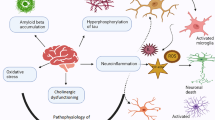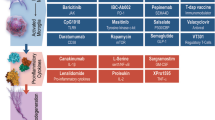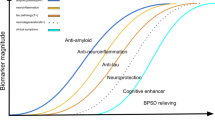Abstract
The triggering events leading to the selective neurodegeneration observed in Alzheimer brains are not yet completely understood. They thus create a great challenge for the definition of a resolutive treatment for the causes and symptoms of Alzheimer’s Disease (AD). Since the current therapeutic option for AD patients is the use of acetylcholinesterase inhibitors (AChEIs), several authors have examined whether these drugs can also affect the expression and metabolism of the amyloid precursor protein (AβPP). The rationale behind these studies was based on the fact that the literature suggests that cholinergic activities are also involved in the regulation of AβPP metabolism. Therefore, the characterization of these aspects of AD pharmacology may allow cholinergic drugs to be tested for their ability to intervene at different levels of the pathogenetic chain, other than providing a replacement therapy for lost neurotransmitters. This paper reviews the evidence that many of these drugs, although with different qualitative effects, are able to modulate the metabolism and expression of AâPP. This effect is often sustained by an indirect cholinergic mechanism and does not affect the mRNA expression of the precursor, although some other authors have demon-strated an effect on post-transcriptional regulation of AβPP expression. In addition to the effect on AβPP processing, we recently explored the possibility that these molecules affect a gene expression program beyond the classical pharmacological effects, for insights on possibly unexplored pathways of intervention in AD.
Similar content being viewed by others
References
Kasa P, Rakonczay Z, Gulya K. The cholinergic system in Alzheimer’s disease. Prog Neurobiol 1997; 52: 511–35.
Giacobini E. Long-term stabilizing effect of cholinesterase inhibitors in the therapy of Alzheimer’ disease. J Neural Transm (Suppl) 2002; 62: 181–7.
Racchi M, Govoni S. The pharmacology of amyloid precursor protein processing. Exp Gerontol 2003; 38: 145–57.
Nitsch RM, Slack BE, Wurtman RJ, Growdon JH. Release of Alzheimer amyloid precursor derivatives stimulated by activation of muscarinic acetylcholine receptors. Science 1992; 258: 304–7.
Racchi M, Mazzucchelli M, Porrello E, Lanni C, Govoni S. Acetylcholinesterase inhibitors: novel activities of old molecules. Pharmacol Res 2004; 4: 441–51.
Lahiri DK, Farlow MR, Nurnberger JI Jr, Greig NH. Effects of cholinesterase inhibitors on the secretion of beta-amyloid precursor protein in cell cultures. Ann NY Acad Sci 1997; 826: 416–21.
Racchi M, Sironi M, Caprera A, Konig G, Govoni S. Short- and long-term effect of acetylcholinesterase inhibition on the expression and metabolism of the amyloid precursor protein. Mol Psychiatry 2001; 6: 520–8.
Mazzucchelli M, Porrello E, Villetti G, Pietra C, Govoni S, Racchi M. Characterization of the effect of ganstigmine (CHF2819) on amyloid precursor protein metabolism in SH-SY5Y neuroblastoma cells. J Neural Transm 2003; 110: 935–47.
Zimmermann M, Gardoni F, Marcello E, et al. Acetylcholinesterase inhibitors increase ADAM10 activity by promoting its trafficking in neuroblastoma cell lines. J Neurochem 2004; 90: 1489–99.
Pakaski M, Rakonczay Z, Fakla I, Papp H, Kasa P. In vitro effects of metrifonate on neuronal amyloid precursor protein processing and protein kinase C level. Brain Res 2000; 863: 266–70.
Yogev-Falach M, Amit T, Bar-Am O, Weinstock M, Youdim MB. Involvement of MAP kinase in the regulation of amyloid precursor protein processing by novel cholinesterase inhibitors derived from rasagiline. FASEB J 2002; 16: 1674–6.
Shaw KT, Utsuki T, Rogers J, et al. Phenserine regulates translation of beta-amyloid precursor protein mRNA by a putative interleukin-1 responsive element, a target for drug development. Proc Natl Acad Sci USA 2001; 98: 7605–10.
Lanni C, Mazzucchelli M, Porrello E, Govoni S, Racchi M. Differential involvement of protein kinase C alpha and epsilon in the regulated secretion of soluble amyloid precursor protein. Eur J Biochem 2004; 271: 3068–75.
Author information
Authors and Affiliations
Corresponding author
Additional information
This work was presented at the “International Meeting — The Aging People”, Pavia, 2–4 September 2004.
Rights and permissions
About this article
Cite this article
Racchi, M., Porrello, E., Lanni, C. et al. Role of acetylcholinesterase inhibitors in pharmacological regulation of amyloid precursor protein processing. Aging Clin Exp Res 18, 149–152 (2006). https://doi.org/10.1007/BF03327431
Received:
Accepted:
Published:
Issue Date:
DOI: https://doi.org/10.1007/BF03327431




